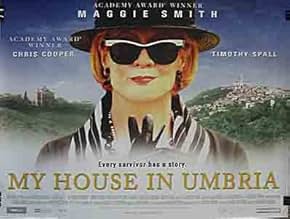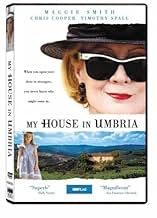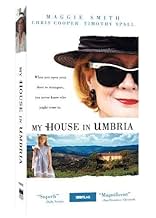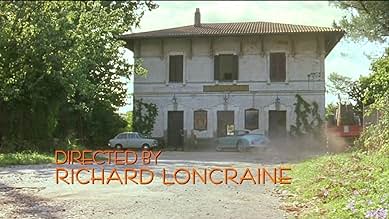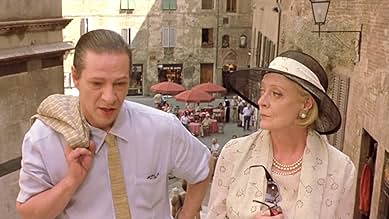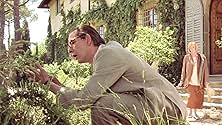AVALIAÇÃO DA IMDb
6,9/10
3,9 mil
SUA AVALIAÇÃO
Adicionar um enredo no seu idiomaAn unlikely group of people find solace and friendship after being thrown together in the wake of a terrorist attack.An unlikely group of people find solace and friendship after being thrown together in the wake of a terrorist attack.An unlikely group of people find solace and friendship after being thrown together in the wake of a terrorist attack.
- Direção
- Roteiristas
- Artistas
- Ganhou 1 Primetime Emmy
- 4 vitórias e 27 indicações no total
Alison Cameron Adam
- General's Daughter
- (as Alison Adam)
Vittoria Colonna
- Young Woman
- (as Vittoria Colonna Di Stigliano)
- Direção
- Roteiristas
- Elenco e equipe completos
- Produção, bilheteria e muito mais no IMDbPro
Avaliações em destaque
A tragedy leaves five people scarred. To heal, one of the survivors invites the others to her home in the Umbrian hills. As she says, to let the beauty of Umbria be a healing balm.
Umbria is one of the stars of the film, yet with a deft hand the director and cinematographer weave its physical beauty to complement the unfolding drama of the film.
Maggie Smith delivers a stunning performance. Her character is a flawed woman who escapes into an alcoholic haze and dreamweaving to explore her soul and the souls of those around her. Ever curious, she delves into places she should not, but always with kind and good intentions.
Chris Cooper plays a persnickety scientist with understated excellence. His facial expressions are magnificent, his words economical, his performance strong.
Ronnie Barker plays a retired English military with aplomb. Beno Furmann delivers a low-key performance, his eyes and his face reflecting guilt and pain. Timothy Spall plays an Irishman with a rare sweetness. A young American girl, Emmy Clarke, plays the film's lynchpin, Aimee, with simple perfection. And Giancarlo Giannini adds a deft touch.
This is a delightful film. There is no glitz, no whiz-bang action. It is a study of the human soul, of the human capacity to deal with pain, to cope, and to survive. The acting ranges from the good to the wonderful, and it is a fabulous example of film-making.
Umbria is one of the stars of the film, yet with a deft hand the director and cinematographer weave its physical beauty to complement the unfolding drama of the film.
Maggie Smith delivers a stunning performance. Her character is a flawed woman who escapes into an alcoholic haze and dreamweaving to explore her soul and the souls of those around her. Ever curious, she delves into places she should not, but always with kind and good intentions.
Chris Cooper plays a persnickety scientist with understated excellence. His facial expressions are magnificent, his words economical, his performance strong.
Ronnie Barker plays a retired English military with aplomb. Beno Furmann delivers a low-key performance, his eyes and his face reflecting guilt and pain. Timothy Spall plays an Irishman with a rare sweetness. A young American girl, Emmy Clarke, plays the film's lynchpin, Aimee, with simple perfection. And Giancarlo Giannini adds a deft touch.
This is a delightful film. There is no glitz, no whiz-bang action. It is a study of the human soul, of the human capacity to deal with pain, to cope, and to survive. The acting ranges from the good to the wonderful, and it is a fabulous example of film-making.
Not since "The Prime of Miss Jean Brodie" has Maggie Smith, nor maybe any other actress, created a character as memorable as Mrs. Emily Delahunty in "My House in Umbria." Smith appears in virutally every scene and does a lot of voice-over narration, too boot. Every frame is a pleasure. "My House in Umbria" is smart, funny, and bittersweet. Chris Cooper has become everybody's choice to play detestable characters. Here, he does it again as the repressed, unhappy, and toweringly rude Tom Riversmith. Because of Riversmith's importance to the plot, though, an actor with Cooper's considerable skill was required to make the movie work. Highly recommended, 9 out of 10.
The HBO TV movie "My House in Umbria" should be seen primarily for the complex and layered performance of divine Maggie Smith. As romance novelist Emily Delahunty, she projects an image of refinement and elegance that conceals a deeper, darker self. That self is revealed slowly, and we find hidden within a character that is not only at variance with Miss Delahunty's adopted persona, but also very different from the prim and proper ladies Maggie Smith habitually plays on the silver screen. We see that Miss Smith is capable even of being seductive and slatternly, most unlike her many repressed and spinsterish roles.
Maggie Smith has the kind of mesmerizing voice and marvelous diction that would enable her to entertain film audiences by reading the proverbial telephone book. I am reminded of Glenda Jackson's (virtual) one-woman show in "Stevie" and Joanne Woodward's voice-over of "The Age of Innocence".
The rest of the characters in "My House in Umbria" are, alas, a motley crew, sketched in only very lightly, merely second bananas to Maggie Smith's central figure. The time of the story is difficult to pin down based on the clothes and motor cars, but one imagines it takes place during the 1970s, the era of the Bader-Meinhof gang in Germany and the Red Brigades in Italy. The denouement is a little too pat, but the journey is still well worth our while.
One of the key questions raised in the film is what anger would drive a human being to commit an act of terror. But it becomes quickly apparent that political terrorism is not the only kind of "man's inhumanity to man" that is intended here. The focus is, rather, on innocence shattered and destroyed, the cruelty visited by individuals upon each other, the sense of guilt that it engenders, and the possibility of forgiveness and redemption that always, always exists if we "seize the day" and allow ourselves to be happy.
Maggie Smith has the kind of mesmerizing voice and marvelous diction that would enable her to entertain film audiences by reading the proverbial telephone book. I am reminded of Glenda Jackson's (virtual) one-woman show in "Stevie" and Joanne Woodward's voice-over of "The Age of Innocence".
The rest of the characters in "My House in Umbria" are, alas, a motley crew, sketched in only very lightly, merely second bananas to Maggie Smith's central figure. The time of the story is difficult to pin down based on the clothes and motor cars, but one imagines it takes place during the 1970s, the era of the Bader-Meinhof gang in Germany and the Red Brigades in Italy. The denouement is a little too pat, but the journey is still well worth our while.
One of the key questions raised in the film is what anger would drive a human being to commit an act of terror. But it becomes quickly apparent that political terrorism is not the only kind of "man's inhumanity to man" that is intended here. The focus is, rather, on innocence shattered and destroyed, the cruelty visited by individuals upon each other, the sense of guilt that it engenders, and the possibility of forgiveness and redemption that always, always exists if we "seize the day" and allow ourselves to be happy.
This is quiet gem of a film. The storyline is basic, almost simplistic, but the direction allows the actors to add value where it counts.
Maggie Smith is delightful as the aged authoress, with a penchant for Grappa who, after a bomb explodes on a train, offer the survivors of her compartment, recuperation at her home in Umbria.
The Italian countryside is simply magnificent, the photography of Maggie Smith's villa and its surrounds(or should I say Mrs Delahunter's villa) gives a beautiful feeling of a somewhat tired place of residence for a somewhat tired individual, who has been there and done that but in a rather upper class British way. There are the usual disparate individuals coming to terms (or not?) with their their problems and then we have the police inspector, trying to suss whether any of the 'guests' can help. Unfortunately this aspect of the film, particularly the dealings with the police inspector, adds little and if anything detracts from the story. It is a necessary component but I feel could have been integrated better.
The supporting cast, particularly Ronnie Barker and Timothy Spall, add to the ambiance of the film and its quiet charm.
Why only seven out of ten? The direction I think is a little too light in that if it were not for the calibre of the actors, this might have been a poor 'B' Movie, but perhaps that is what the Director intended by letting good acting raise the film beyond its basic storyline.
This is now shown on TV, so give yourselves a treat, forget being a film reviewer and just soak up the acting and the atmosphere. If it is not on your local TV, it is worth renting for a night - just make sure you and you partner(it is essential that you and your partner watch this together) have a nice chilled glass of a sparkling Italian wine and indulge in quiet, but thoroughly pleasant entertainment.
Maggie Smith is delightful as the aged authoress, with a penchant for Grappa who, after a bomb explodes on a train, offer the survivors of her compartment, recuperation at her home in Umbria.
The Italian countryside is simply magnificent, the photography of Maggie Smith's villa and its surrounds(or should I say Mrs Delahunter's villa) gives a beautiful feeling of a somewhat tired place of residence for a somewhat tired individual, who has been there and done that but in a rather upper class British way. There are the usual disparate individuals coming to terms (or not?) with their their problems and then we have the police inspector, trying to suss whether any of the 'guests' can help. Unfortunately this aspect of the film, particularly the dealings with the police inspector, adds little and if anything detracts from the story. It is a necessary component but I feel could have been integrated better.
The supporting cast, particularly Ronnie Barker and Timothy Spall, add to the ambiance of the film and its quiet charm.
Why only seven out of ten? The direction I think is a little too light in that if it were not for the calibre of the actors, this might have been a poor 'B' Movie, but perhaps that is what the Director intended by letting good acting raise the film beyond its basic storyline.
This is now shown on TV, so give yourselves a treat, forget being a film reviewer and just soak up the acting and the atmosphere. If it is not on your local TV, it is worth renting for a night - just make sure you and you partner(it is essential that you and your partner watch this together) have a nice chilled glass of a sparkling Italian wine and indulge in quiet, but thoroughly pleasant entertainment.
10diane-34
Seeing Maggie Smith's character start the day with a wee glass of grappa and end her day with another is not exactly what we have come to expect from this marvelous actor but these twists in William Trevor's novella are precisely what the viewer is presented with throughout this wonderful film. My statement is in no way meant to denigrate the scrip-it simply is a signpost indicating the varied paths that the viewer follows as the film progresses.
The visual beauty of the film is taken for granted because of its magical setting-it's just the many little detours taken by the characters during the course of the unfolding drama that kept this poor viewer from anticipating the unfolding script changes. I saw a film I didn't quite expect to see because the early publicity seemed to gloss over these script changes. However, the resulting movie was better and more interesting than any I could have predicted-in part due to the remarkable acting of the cast.
Maggie's character is the mover of the film and all events revolve around her. Her character is strangely ambivalent in that she at first sight is this straight laced woman who appears to do everything "properly" but as the film unfolds she shows many more aspects to her role. For me it was similar to watching an onion being peeled and I found each underlying layer more interesting than the previous. Chris Cooper's character was also intrigued by this unfolding but he didn't find what he saw as interesting as I did.
Try to watch this lovely, interesting film-you can spend your time in a theater in far worse ways.
The visual beauty of the film is taken for granted because of its magical setting-it's just the many little detours taken by the characters during the course of the unfolding drama that kept this poor viewer from anticipating the unfolding script changes. I saw a film I didn't quite expect to see because the early publicity seemed to gloss over these script changes. However, the resulting movie was better and more interesting than any I could have predicted-in part due to the remarkable acting of the cast.
Maggie's character is the mover of the film and all events revolve around her. Her character is strangely ambivalent in that she at first sight is this straight laced woman who appears to do everything "properly" but as the film unfolds she shows many more aspects to her role. For me it was similar to watching an onion being peeled and I found each underlying layer more interesting than the previous. Chris Cooper's character was also intrigued by this unfolding but he didn't find what he saw as interesting as I did.
Try to watch this lovely, interesting film-you can spend your time in a theater in far worse ways.
Você sabia?
- CuriosidadesMrs. Emily Delahunty's (Dame Maggie Smith's) car is an Alfa Romeo 6C-2500, produced between 1947 and 1953. It is a five-seat touring car popular with affluent post-war customers interested in a sporty yet comfortable vehicle.
- Citações
Mrs. Emily Delahunty: In the garden, delphiniums were in flower. Through scented twilight, the girl in the white dress walked with a step as light as a morning cobweb. That evening she hadn't a care in the world.
Principais escolhas
Faça login para avaliar e ver a lista de recomendações personalizadas
Detalhes
- Data de lançamento
- Países de origem
- Central de atendimento oficial
- Idiomas
- Também conhecido como
- My House in Umbria
- Locações de filme
- Empresas de produção
- Consulte mais créditos da empresa na IMDbPro
Bilheteria
- Faturamento bruto mundial
- US$ 1.324.900
- Tempo de duração
- 1 h 43 min(103 min)
- Cor
- Mixagem de som
- Proporção
- 1.85 : 1
Contribua para esta página
Sugerir uma alteração ou adicionar conteúdo ausente

